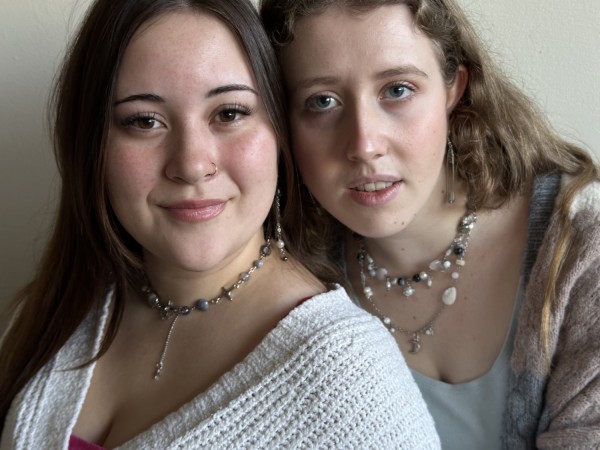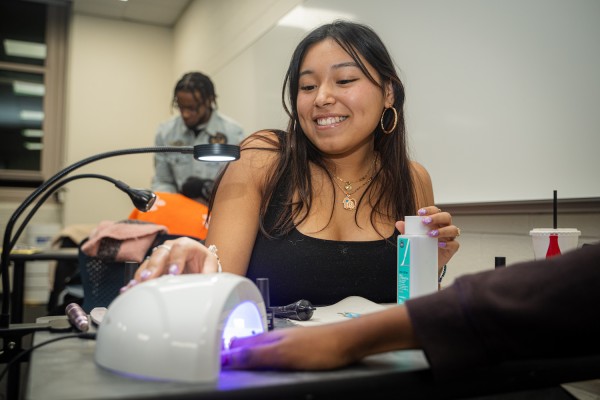At a time when it’s increasingly difficult to find affordable beauty services around Manhattan, students running small businesses from their dorms are filling that void for us. Here’s how three students transformed cramped quarters into beauty sanctuaries, offering budget-friendly alternatives and promoting creative expression in our residence halls.
Styles by Assiy

Hair braiding has been a part of CAS junior Assiy Traore’s life for as long as she can remember. Growing up with her mother working as a hair braider, the practice is a way of connecting with her family and greater community. The influence of Malian and Senegalese culture in her life has also allowed her to build her practice naturally. Traore was able to hone her skills by both practicing the styles she observed growing up, and incorporating modern trends she learned from platforms like YouTube and TikTok.
“Hair is not just a physical attribute — it’s a powerful symbol of identity, self-expression and heritage,” Traore said. “For many of us [Malian and Senegalese people], it’s a source of pride and a means of connecting with our roots.”
Traore also knows being a college student can make it hard for many to afford self-care practices such as hair-braiding, which can be pricey.
“I want to ensure that everyone, regardless of their economic circumstances, can embrace and celebrate their hair,” she said.
Her business, STYLES BY ASSIY inc., began through word-of-mouth before she decided to open an official Instagram account for it. Social media is a convenient platform for Traore, allowing her to engage with those interested in her talents regardless of gender or culture. Traore excels at a myriad of braiding styles, including twists, box braids, parted braids and knotless braids.
Having this business in her dorm benefits not only Traore, but her clients as well. Traore said that many local beauticians tend to overcharge or may not be experienced working with Black hair. Long commutes and busy schedules also present barriers to accessing these beauty services. As a result, Traore wanted to bridge this gap and help foster community between NYU’s Black and brown students.
“I hope to not only enhance individuals’ confidence and self-expression but also foster a sense of belonging and community,” Traore said. “Embracing and celebrating our hair is a powerful form of cultural preservation and self-affirmation.”
Pororo House

Jewelry is more than a fashion statement for Steinhardt sophomore Safalta “Aashi” Shukla — it’s a way for her to stay connected to her Indian background wherever she goes.
“With every step I take, my culture is with me,” Shukla said.
Shukla took this connection with her culture and transformed it into her jewelry-making business, Pororo House. At first, it was no more than a hobby, but it gained momentum when her friends expressed interest in her work.
“I wanted to have a hobby, something I could keep myself busy with,” Shukla states. “And I feel like this was a pretty creative and productive way for me to make something and share it with other people.”
Pororo House has a personalized approach to aesthetics. When making commissioned pieces, Shukla uses music to connect the customer with the piece.
“I ask someone to give me a song, a genre or an album they want the vibe for and I try to recreate that in a physical form — something you can wear,” she said.
There are pros and cons to jewelry-making in Shukla’s dorm, however. The dorm desk space is small, making it hard to create more intricate pieces. Her setup consists of three boxes filled with metal charms, glass and porcelain beads, wiring, loops and various other tools. Shukla tries to bring materials home for school breaks, where she has more space — but, for the most part, she makes most of her jewelry in her dorm.
Thankfully, being in a dorm allows her to connect to more students. And, having this outlet relieves some of the pressure from school and lets her take a break to create art.
Nails by Brit

Tandon junior Britney Urrutia always had a passion for nail design. Growing up gawking over the delicate, polished nails of her family members, the art form came easily for Urrutia.
“Seeing my mom and my older cousins having their nails done was a way to demonstrate femininity,” Urrutia said. “It is a way to still feel and look cute and put together … it makes you feel feminine.”
Spurred by her interest in the beauty industry, Urrutia’s nail business journey began with curious exploration. With her first client, Urrutia was simply experimenting with design and color.
What started as a small passion project soon blossomed into a business, with daily appointments becoming the norm. Urrutia now draws inspiration from Pinterest, Instagram and her own experience to tailor her services to her clients. She offers basic clean-ups, regular gel, gel extensions and soak-offs. She also aims to improve her skill set by getting certified in areas like acrylic nails.
“I feel like I’ve gotten a lot faster and a lot better at designing,” Urrutia said. “I hope to get very experienced where I can demonstrate my Latin culture in the nails that I do.“
Her business was more active in her sophomore year. But after acquiring a job coupled with her school work, it has become more of a side hustle. Despite this, she has big plans for her future in nail beauty as she aims to expand her business and offer more services.
With her busy schedule, Urrutia often brings her nail business on the road as she moves around the city. Operating from these locations not only allows her to manage scheduling challenges, but also be considerate of her roommates. She’s also committed to accommodating her clients’ busy college schedules, sometimes taking her services to locations like Bobst Library.
She also recognizes the financial constraints of college students, so she deliberately sets out to offer quality services at affordable prices. Since most students can’t always splurge on a lavish $100 nail treatment, Urrutia offers sets that range from $10 to $35 depending on the style of the nails.
“I wanted to offer something that was still nice and could last long but also on the cheaper side because we’re all just college students,” Uruttia said.
As Urrutia continues to improve, her aspirations extend beyond proficiency — she hopes to gain diverse experiences that allow her to further weave her culture into the designs she crafts.
Contact Noor Maahin at [email protected].























































































































































